Opinion

There’s no way I could imagine forgetting this baby nursing at my breast. Not only wouldn’t my body allow me that, feeding my son wasn’t an obligation or a duty. It was a time I looked forward to with joy. Even those middle of the night wake-ups were still one more opportunity to snuggle that sweet little boy.
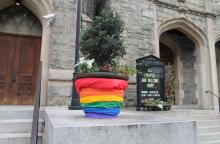
One could ask whether taking a vote from 800 delegates from different regions, cultures, and countries, but all part of an increasingly global United Methodist Church, is the best way to discern the will of God or how a denomination should move forward. That’s what former Methodist Bishop Will Willimon wondered to me yesterday, the day after the historic vote to strengthen the church’s “traditional” ban against LGBTQ clergy and marriages. Willimon was disappointed that “once again, the Methodist Church is a mirror of the culture.” The vote showed again how divided the church is, as the vote was nearly split down the middle. That split shows, painfully, that the church is no better place to heal division than anywhere else in our culture.

The semantics are important to understand because the different terms present two completely contrasting paradigms. One is based on textual interpretations and opinions, while the other is founded upon the words and actions of the living savior of the world. If you’re a Christian, you should always err on the side of Jesus. But if we’re not careful, it’s easy to idolize the bible while simultaneously ignoring the very message of Christ.

As a multiracial Christian, growing up in white evangelicalism challenged my sense of belonging. Fitting in was dependent on how well I could match the church culture. Minorities understand that being accepted by the dominant culture means living out a characterization of ourselves rather than our whole selves. We must think and act with sameness to the dominant church in order to belong.
Where are the safe and brave church spaces for Christians of color?

When I began my theological education, I encountered an even more disturbing reality: the presence of “texts of terror” as Hebrew scholar Phyllis Trible calls them. These heinous sexual crimes and acts of violence committed against women were captured right there, plain as day, in the holy book I treasured.

I’m always very curious about what belonging truly means to a community, and how it is demonstrated. I always wondered, who makes the rules of belonging? Who decides what is and isn’t allowable? Can it go so far as to diminish our humanity or cause us to diminish someone else’s? Many of my early talks with God included questions like these. I still don’t have the answers to all of them, but I’ve spent the past several years trying to find a home inside of the tension between our revolutionary capacity for love as human beings, and our frequent tendencies toward exclusion, destruction and harm.
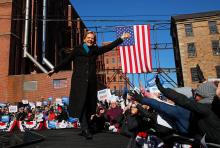
Many people, both inside and outside of the church, spoke about the problem of child care according to the same reasons. They viewed it as a complex, local problem with complex, local solutions. A team of parents attempted to create a new center and soon discovered the massive amount of capital, time, energy, and attention it would take. Everyone involved insisted that some solution must be possible if only we could bring together various stakeholders in the community to find a way to provide child care for those that need it. But this obscures the truth about the problem of child care in capitalism: It’s not complex and local, but big and universal.

As thankful as I am to see Greear speaking clearly and mournfully about sexual abuse in the SBC, I feel concerned by this praise-swirled-with-certainty-of-divine-intervention. It seems to surpass encouragement and land at a premature rendering of Greear as a hero. I fear that too many are equating words of sorrow over sexual abuse with a proportionate, justice-oriented response.

So now, here the church sits staring in the face of human rights violations being committed in our national name. Here we sit privy to the betrayal of anything we could possibly claim the gospel to be about — from the actual life story of Jesus and his dark-skinned, refugee family to the theological imperative to love one’s neighbor and stand with the most vulnerable. Here we sit bearing witness to breathtaking levels of racialized, religious violence being emboldened by this administration’s rhetoric and policies.

It is also from this rage and this discontent that Black people in America created and orchestrated their own culture, ensuring that legacy and heritage would exist for their children. They gathered in “hush harbors” to worship their God and Maker, absent of slaveholder religion and influence, tapping into the untampered presence of the Holy Spirit and the deities of the Motherland. They took the slop and remains of the plantation and created a delicacy now known as “soul food”.
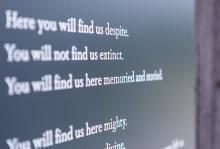
I left the memorial and museum wondering what will be next? Will my 6- and 8-year-old son’s generation decide to construct memorials to the black men and women who were slain by racialized policing and police violence during the era in which they came of age?
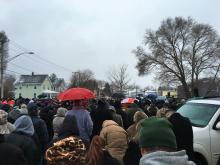
Two days after a brutal workplace shooting in the Chicago suburb of Aurora, where five were killed and six were injured, over 1,000 people joined together for a prayer vigil at the Henry Pratt Company plant, filling the street near the building where the shooting occurred. As several local pastors shared prayers with the huge gathering of mourners, the only sounds that broke the silence between prayers were quiet sobs. Beside a gate connected to the plant, people placed flowers, candles, and signs.

And I can’t help but think about my friends on “life” row who live daily in that space. They know that their execution dates can be set at any moment, but they also know that they are alive now and have to live into as much of the fullness of the day as they possibly can. It can be difficult, at times, to sit in the liminal space with my friends, as I never know which they will choose — will they choose life or will they choose death to discuss? And the truth is that they pick both. They need to process their death while they are living. And they have to process their living while they know they face a certain death.

On Ash Wednesday 2018, a group of elders met for a retreat together because of a national political crisis, which was also revealing a crisis of faith. At Pentecost, in overcrowded churches in downtown Washington, D.C., we launched a declaration that we called Reclaiming Jesus: A Confession of Faith in a Time of Crisis. More than 5 million people have directly responded to the Reclaiming Jesus declaration thus far and many more have been reached by it and are addressing the declaration in their churches. A declaration is becoming a movement to re-claim Jesus; the message of Jesus needs reclaiming at a time like this.

This week, scores of people will once again experience the grief of missing loved ones who were cut down by a deranged young man with multiple deadly weapons in the high school he shared with his victims. The Parkland, Fla. mass shooting at Marjory Stoneman Douglas High School, which killed 17 people and injured 17, joins the 2012 Sandy Hook Elementary School shooting, which wiped out a classroom of precious children, as two of the most horrific moments in American history. The irony that the Parkland slaughter was on Valentine’s Day only increases the suffering. While many will celebrate having and enjoying their loved ones in their lives, the Marjory Stoneman Douglas High School survivors will only feel afresh a terrible vacuum.

Christian music singer/songwriter Ellie Holcomb released her first children's album, Sing: Creation Songs, in September with an accompanying children's book called Who Sang the First Song?. In January, she and her partner, Drew Holcomb, frontman of Drew Holcomb and the Neighbors, dropped an EP called Electricity.
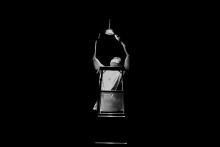
“For us America is our own country, and it’s all the same: hopeless,” the general told his solider.
General Simón Bolívar had lost faith. The great Liberator of Latin America who fought for independence from Spain, with a vision of a continent united as a single nation would never happen. His men wore the wounds of the revolutions his words inspired and only the frail old man at the end of his life knew how worthless they had been. Political and social change was impossible. He had known the cause was lost for years and kept fighting out of despair, with no dream of any meaningful end.

As adults, if we get the chance to deconstruct our childhood faith, it can often be a traumatic process. Many of us share stories about working with a therapist to unpack trauma from the church, whether it is from the purity movement or the ongoing work of colonization. If you have spent much time on Twitter, you might find some of these conversations floating around, especially in ex-evangelical spaces. Many of us who grew up in the white evangelical church are asking questions about things like missions ideology, white supremacy in the church, toxic patriarchy and sexism, and violence against our LGBTQ friends.

As is so often the case, it is the poor and marginalized that are the most vulnerable to these arrogant battles of political will. We have now seen that our leaders were willing to hold families and their children hostage, allowing their wellbeing to be threatened by the reckless shut down of portions of the federal government for nothing more than partisan political gain.

Rigid gender performance is a cultural construct, not a divine decree. Truly, if we are created in the image of God, we are made to transgress narrow definitions of “masculine” and “feminine” behavior. The God of Scripture is neither male nor female, transcending human conceptions of gender altogether. Though frequently referred to with masculine pronouns, at other times God is described in the feminine, as a comforting mother (Isa 66:13) or a hen guarding her brood (Luke 13:34). As Patrick Cheng notes in Radical Love, “God is fundamentally queer,” breaking through any human attempt to restrict God’s gender expression — this is also why Morse’s attempt to lift Jesus up as masculine exemplar rings so hollow; if God and Jesus are one, then Jesus’ “maleness” is purely incidental.